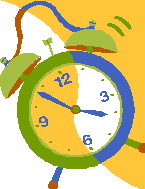|
|
Teacher AreaSleep Log ActivityGrades: 5-12, college. Subjects: Health (healthy lifestyles), Science (behavioral self-research, scientific rigor), Psychology (sleep, habits, behavioral change) |
|
|
|
|
|
Overview: Students will use scientific rigor to track and record information about their own sleep. Students will compare their sleep habits to those of other students. Students will evaluate their own health habits re: the quantity and quality of their own sleep. Students will identify how various factors affect their sleep. Materials: Sleep Log Worksheet (Microsoft Word document) Introductory Discussion Questions:
Procedure: Explain that students are to individually track their own sleep over the next 2 weeks, paying careful attention to what things affect the quantity and quality of their sleep. Distribute sleep log worksheets, and explain in detail how to complete them. Suggest keeping the logs at bedside for convenience. Periodically remind the students to be working on their sleep logs, and/or check their progress. When the logs are complete, have students go to the "How Does Your Sleep Measure Up?" page of the STUDENT area of this web site and compare their sleep to other studentsí. Points for Discussion:
Possible extensions Teachers: Compile and average the entire classís data. Challenge the students to improve their sleep pattern, sleeping 9-10 hours per night for one week, and have them write about the experience. Give awards for students with the healthiest sleep patterns. Students: Keep a partial sleep log (during your own waking hours) for an infant Ė less than 4 months old Ė or a pet (your "subject"), one weekend day. (You may want to use an alarm watch or other device to remember to check the subjectís behavior every 10-15 minutes. ) What differences do you notice between your log and the subjectís log? Investigate the reasons why your subject displays different sleep patterns than yours. Experiment with environmental factors (noise, light, temperature, etc.) to see how your sleep environment affects your sleep. Change only one thing at a time. Keep careful records of your results. Interview people of different ages and backgrounds (for example, a new parent, a shift worker, an elderly person) about their sleep habits. Compare and contrast their habits with your own. |
|
|
